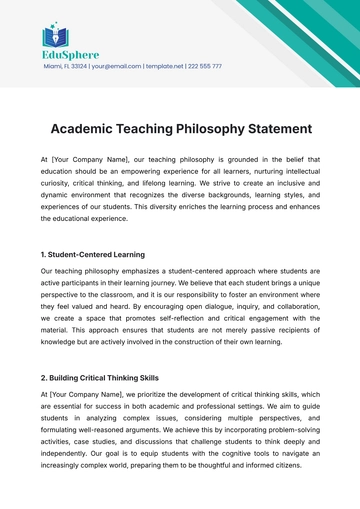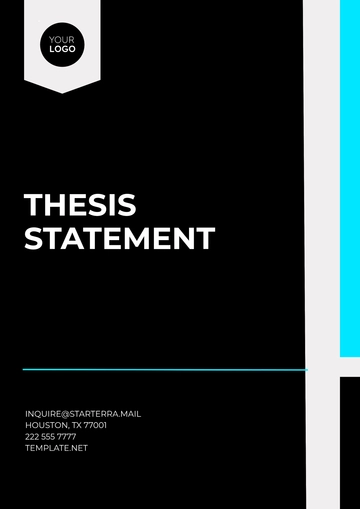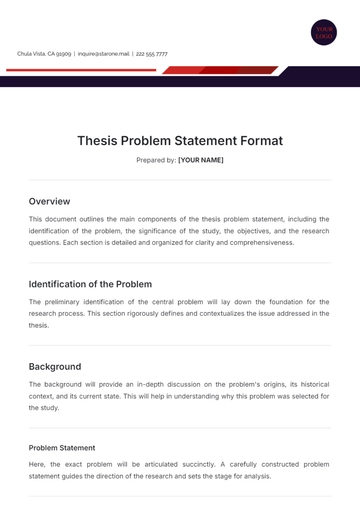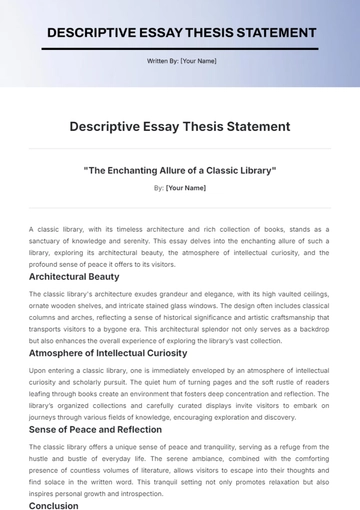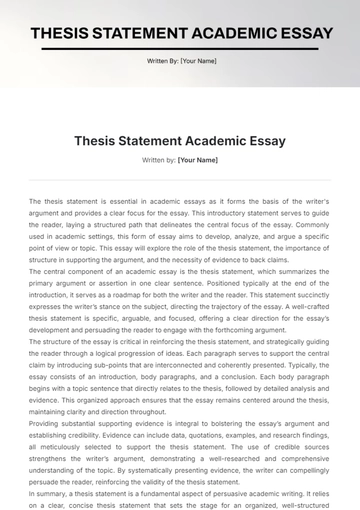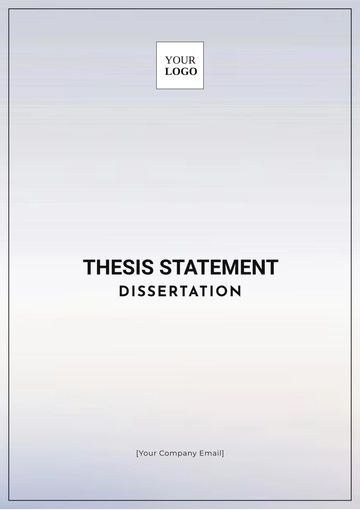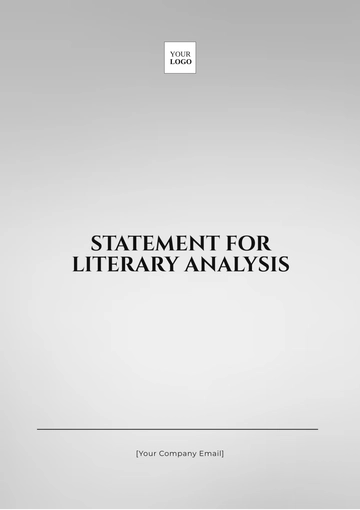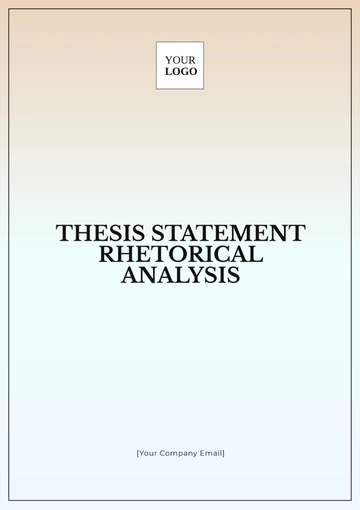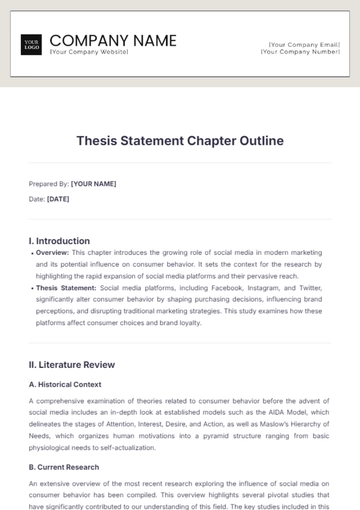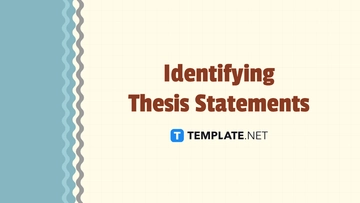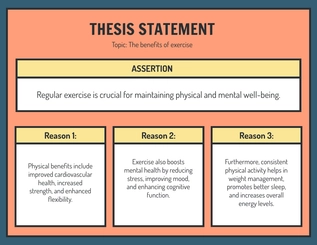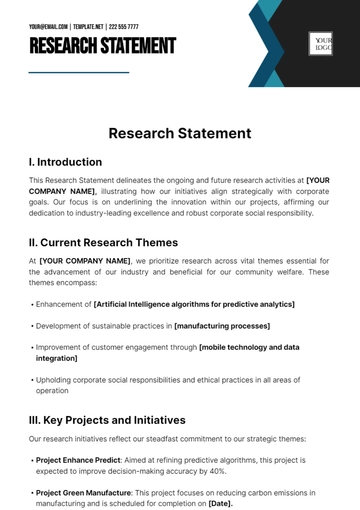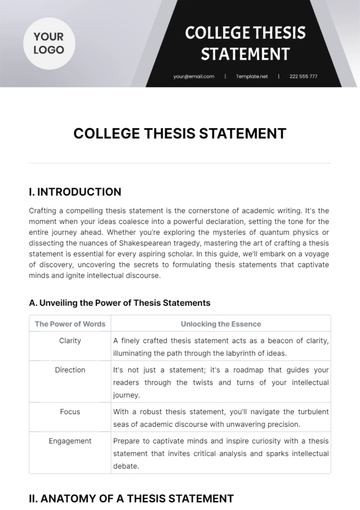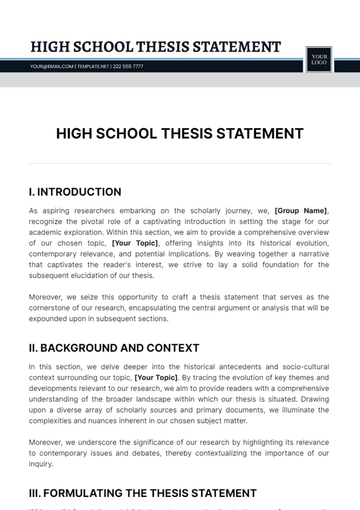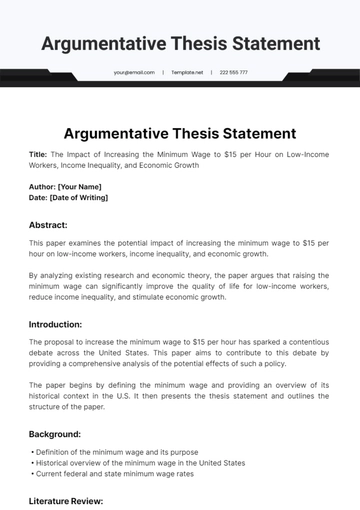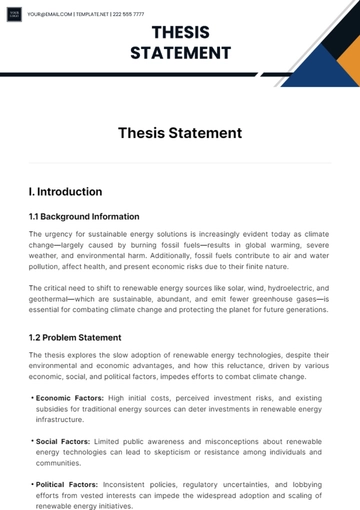Free Thesis Statement
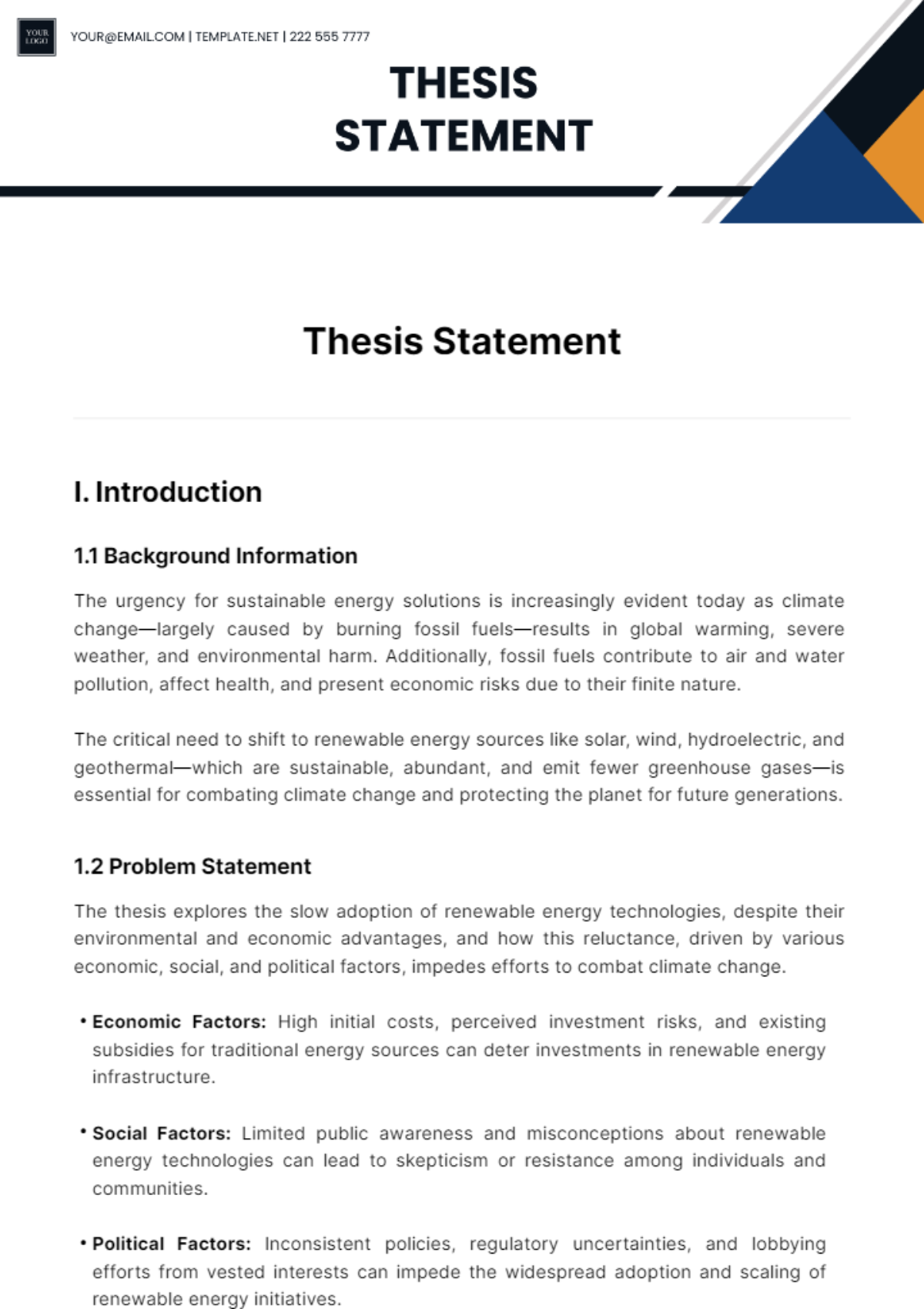
I. Introduction
1.1 Background Information
The urgency for sustainable energy solutions is increasingly evident today as climate change—largely caused by burning fossil fuels—results in global warming, severe weather, and environmental harm. Additionally, fossil fuels contribute to air and water pollution, affect health, and present economic risks due to their finite nature.
The critical need to shift to renewable energy sources like solar, wind, hydroelectric, and geothermal—which are sustainable, abundant, and emit fewer greenhouse gases—is essential for combating climate change and protecting the planet for future generations.
1.2 Problem Statement
The thesis explores the slow adoption of renewable energy technologies, despite their environmental and economic advantages, and how this reluctance, driven by various economic, social, and political factors, impedes efforts to combat climate change.
Economic Factors: High initial costs, perceived investment risks, and existing subsidies for traditional energy sources can deter investments in renewable energy infrastructure.
Social Factors: Limited public awareness and misconceptions about renewable energy technologies can lead to skepticism or resistance among individuals and communities.
Political Factors: Inconsistent policies, regulatory uncertainties, and lobbying efforts from vested interests can impede the widespread adoption and scaling of renewable energy initiatives.
II. Thesis Statement
2.1 Main Argument
This thesis argues that a comprehensive approach combining public awareness, government policies, and stakeholder collaboration is essential to address the challenges hindering renewable energy adoption. Such strategies can effectively tackle economic, social, and political barriers, promoting sustainable energy globally helping mitigate climate change, and enhancing environmental sustainability.
2.2 Supporting Points
Public Education Campaigns: Public awareness and educational campaigns are crucial in promoting renewable energy by correcting misconceptions, highlighting benefits, and encouraging community adoption, thus fostering sustainable energy practices long-term.
Government Incentives: Governments boost renewable energy investments and innovation through subsidies, tax credits, and supportive regulations, reducing financial barriers and enhancing technology and competition in the sector.
Collaborative Efforts: Collaboration among governments, industries, NGOs, and research institutions enhances the development and deployment of renewable energy technologies through knowledge sharing, technology transfer, and public-private partnerships, expediting the shift to a sustainable energy future.
III. Methodology
3.1 Literature Review
The research approach for this thesis involves conducting an extensive literature review to gather insights from a diverse range of sources such as academic journals, books, and reputable publications. Key areas of focus within the literature review include:
Renewable Energy Technologies: Understanding the latest advancements and innovations in renewable energy technologies across various sectors like solar, wind, hydroelectric, and geothermal power.
Barriers to Adoption: Exploring the economic, social, and political challenges that hinder widespread adoption of renewable energy solutions globally.
Public Perceptions: Investigating public attitudes, perceptions, and awareness regarding renewable energy benefits, drawbacks, and potential misconceptions.
Government Policies: Analyzing national and international policies, regulations, incentives, and frameworks that impact the adoption and integration of renewable energy into energy systems.
Collaborative Initiatives: Examining successful collaborative efforts among stakeholders including governments, industries, NGOs, and research institutions aimed at promoting renewable energy adoption.
2.2 Policy Analysis
The research methodology includes a detailed analysis of national and international policy documents impacting renewable energy adoption and integration. This is essential to grasp the regulatory environment, incentives, and frameworks shaping the renewable energy sector. Key focus areas of the policy analysis are:
Key Incentives
Feed-in Tariffs (FiTs): Evaluating the effectiveness of Feed-in Tariffs (FiTs) in securing fixed prices for renewable energy, and their influence on project viability and investor confidence.
Tax Credits and Incentives: Analyzing tax incentives, deductions, and credits for renewable energy stakeholders and their impact on investment in green infrastructure and technology.
Subsidies and Grants: Analyzing government subsidies, grants, and support programs for renewable energy adoption, including their allocation, distribution, and effectiveness.
Regulations and Frameworks
Renewable Energy Standards: Evaluate mandatory renewable energy targets and standards, including their compliance, monitoring processes, and penalties.
Carbon Pricing Mechanisms: Analyzing carbon pricing schemes, including carbon taxes and cap-and-trade systems, to evaluate their effectiveness in promoting renewable energy investments and cutting greenhouse gas emissions.
Energy Efficiency Mandates: Analyzing policies and efforts aimed at enhancing energy efficiency in buildings, industries, and transport. Exploring the interplay between energy efficiency initiatives and renewable energy adoption.
Sustainable Development Goals (SDGs): Evaluating renewable energy policies to align with global sustainability goals like the UN SDGs, focusing on climate action, affordable energy, and sustainable communities.
3.3 Case Studies
The research methodology incorporates the analysis of case studies from diverse global regions to illustrate successful strategies and best practices in overcoming barriers to renewable energy adoption. These case studies focus on:
Implementation Success: Examining projects such as community solar programs, offshore wind farms, energy storage installations, and decentralized renewable energy systems that have demonstrated successful adoption and integration.
Innovative Financing Models: Exploring financing mechanisms, public-private partnerships, green bonds, and crowdfunding initiatives that have facilitated investments in renewable energy projects.
Collaborative Initiatives: Highlighting joint efforts between public and private sectors, academia, and civil society organizations that have led to technological innovation, knowledge sharing, and capacity building in renewable energy sectors.
IV. Analysis and Discussion
The analysis and discussion section of this thesis interprets evidence from extensive research to examine trends, patterns, and correlations in renewable energy adoption, policy effectiveness, and stakeholder engagement. It aligns findings with the thesis statement, addresses counterarguments, and reaffirms the thesis's validity.
Renewable Energy Adoption Trends
Analyze global and regional trends in renewable energy adoption rates, capacity additions, and investment flows. Identify key factors driving or hindering adoption across different sectors residential, commercial, industrial, and utility-scale.
Examine case studies and success stories of countries or regions that have achieved significant milestones in renewable energy deployment. Highlight strategies, policies, and initiatives that contributed to their success.
Policy Effectiveness Assessment
Evaluate the effectiveness of key policy instruments such as feed-in tariffs, tax incentives, renewable energy standards, and carbon pricing mechanisms in promoting renewable energy investments and deployment.
Assess the coherence and consistency of renewable energy policies across different levels of government (national, regional, local) and their alignment with long-term sustainability goals.
Stakeholder Engagement and Collaboration:
Explore collaborative efforts among governments, industries, NGOs, research institutions, and communities in advancing renewable energy agendas. Analyze the impact of stakeholder engagement on project development, innovation, and public acceptance.
Discuss challenges and opportunities related to stakeholder coordination, knowledge sharing, technology transfer, and capacity-building initiatives.
Addressing Counterarguments
Cost Concerns: Share data from analyses and case studies showing how renewable energy tech has become cheaper, with long-term economic benefits, job creation, and external cost savings.
Intermittency Issues: Examine how advancements in energy storage, smart grids, demand-side management, and grid integration address the intermittency of renewable energy sources such as solar and wind.
Infrastructure Limitations: Highlight successful examples of infrastructure projects, public-private collaborations, and innovative funding strategies that focus on upgrading grids, easing transmission bottlenecks, and implementing decentralized energy systems.
V. Conclusion
In conclusion, this study has delved into critical aspects of renewable energy adoption, policy effectiveness, stakeholder engagement, and the broader implications for sustainable development and global environmental initiatives. The key findings and conclusions derived from the analysis strongly reinforce the main thesis statement, which emphasizes the need for a multi-faceted approach to overcome barriers and promote the widespread adoption of renewable energy solutions.
VI. Broader Implications and Recommendations
Energy Policy: Policymakers should update renewable energy policies to meet global sustainability goals like the Paris Agreement and SDGs, improving financial incentives, simplifying regulations, and encouraging cross-sector collaboration.
Sustainable Development Goals (SDGs): The research highlights how adopting renewable energy supports crucial SDGs like affordable and clean energy (SDG 7), climate action (SDG 13), and sustainable cities (SDG 11). Policymakers should utilize renewable solutions to achieve these key goals.
Global Environmental Initiatives: The study emphasizes that international collaboration, technology sharing, capacity building in developing areas, and financial support are essential to effectively tackle climate change and promote global renewable energy use.
Actionable Recommendations: Stakeholders are urged to fund innovative renewable energy research, focus on energy efficiency, support decentralized energy solutions, and participate in global knowledge exchange platforms.
- 100% Customizable, free editor
- Access 1 Million+ Templates, photo’s & graphics
- Download or share as a template
- Click and replace photos, graphics, text, backgrounds
- Resize, crop, AI write & more
- Access advanced editor
Elevate your academic work with our Thesis Statement Template from Template.net, designed for achieving excellence. Easily customizable, it guides scholars in structuring research focus and arguments effectively. Our Ai Editor Tool makes it editable, empowering scholars to craft compelling and coherent thesis statements effortlessly. Take your scholarly endeavors to new heights with this user-friendly template, facilitating rigorous research
